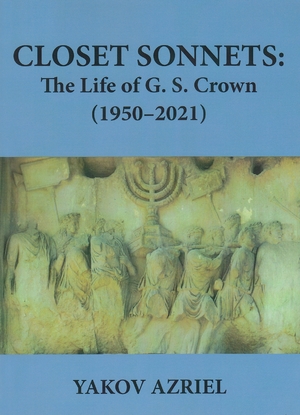"In Closet Sonnets, Yakov Azriel turns life as a closeted gay male into an aesthetic form as rigorous as that of the sonnets that make up this :fictional autobiography: the speaker's self-limitation becomes a means of imaginative and rhetorical intensification. Through a shifting weave of images and metaphors—mermen, ancient Greeks, Martians, dream-lovers and real men glimpsed through the bars of heterosexual marriage—Azriel's character maps every inch of his psychic closet, and, like Dylan Thomas at the end of 'Fem Hill,' 'sighs in his chains like the sea.'"—Joy Ladin, author of Through the Door of Life: A Jewish Journey Between Genders
"Sexuality and love are partially understood mysteries. Homosexuality is believed by the vast majority of competent psychiatrists to be genetic and normal. Abnormalities are caused by physical impairment, experience, and mysteries of character. Many folks and holy books to the contrary, that love should be criminalized is obviously a primitive, grotesque horror that, historically, tortures more often than not An everyday writer or even a gossip may tell his or her story factually and it may be more than noise, moving. To tell the story and make uniquely beautiful poetry of it makes these sonnets necessary reading."—Stanley Moss, author of Almost Complete Poems
"Azriel writes with the kind of authority rarely found among modem poets, with strong echoes of Hayim Nachman Bialik, whose biblical poems have themselves become sacred texts."—Howard Schwartz, author Tree of Souls: The Mythology of Judaism
About the Author
Yakov Azriel was born in New York in 1950 as Gerald Rosenkrantz, received his B.A. in English summa cum laude at Brooklyn College 1971, moved to Israel, changed his name to Yakov Azriel, studied at Yeshivas in Jerusalem and Alon-Shwt, received a doctorate in Judaica concentrating on the stories of Rabbi Nachman of Braslav, and was awarded a fellowship from the Memorial Foundation for Jewish Culture 2004-5 for his poetry, his international prizes including the 2004 Miriam Lindberg Poetry for Peace Prize. This is his fifth book of poetry.
November 2017

